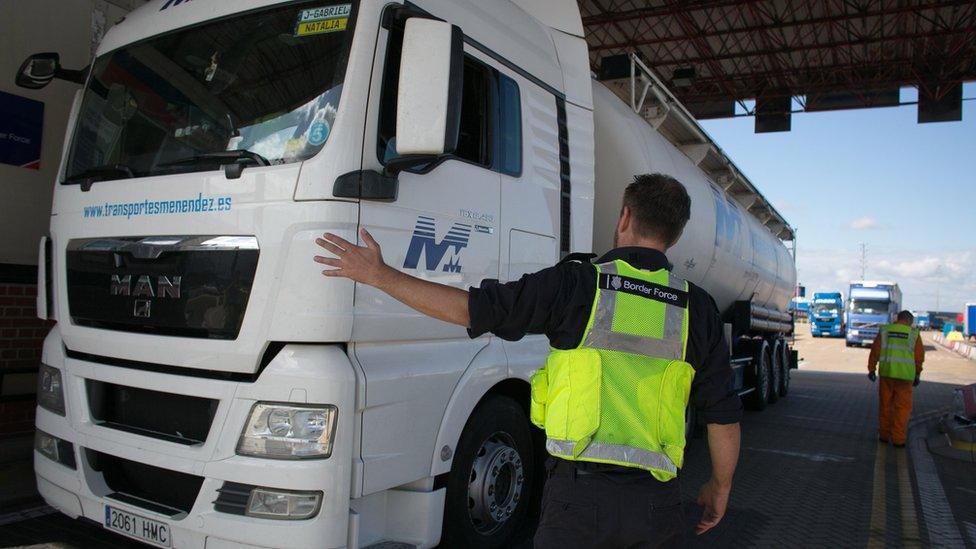Brexit: Government did not speak to French ports in no-deal plan
- Published

The government has not spoken to French ports and has used satellite imagery to make "untested" assumptions for its no-deal Brexit plans for Portsmouth.
A Department for Transport document from January, seen by BBC Newsnight, said: "We have not engaged with French port operators or the ferry companies".
Earlier this year, the government was forced to axe its no-deal contract with a ferry-less shipping company.
The Department for Transport said it does not comment on leaked documents.
The document, called "EU Exit No Deal Planning: Portsmouth Port Analysis", makes an official assumption that French ports would have capacity to hold vehicles - that have sailed from the Hampshire port - while they are waiting to be checked by customs.
"Our assessment is based on satellite imagery and conversations with Border Force South of the port layouts," it states.
"We have not engaged with French port operators or the ferry companies sailing to these ports so these assumptions are untested."
'Worst case scenario'
The 12-page report was obtained by officials involved in running the ferry terminal at Portsmouth - a key alternative to Dover for cross-Channel freight transport and ferries.
A DfT spokesman said: "As a responsible government it is only right that we push on with contingency planning, and we continue to work closely with ports to help them prepare for any potential impacts of the UK's exit from the EU."
Government sources added that since the January document was put together, DfT had been in contact with Brittany Ferries and discussed the capacity issues at French ports.
But Hampshire's Local Resilience Forum (LRF) which represents local agencies - including the emergency services, Portsmouth City Council and Portsmouth International Port - said they have to plan for a "reasonable worst case scenario".
"That scenario, for us, includes lorries queuing on a busy entry point to Portsmouth, and the potential for the resulting disruption," LRF chairman Neil Odin said.
"Portsmouth International Port is important to the Channel Islands and is proximal to a critical Naval asset; disruption at the Port could have a wide ranging impact."
In February, the government scrapped its £13.8m no-deal Brexit contract with a ferry company which had no ships, after the Irish company backing the deal pulled out.
Transport Secretary Chris Grayling had faced criticism for the £13.8m deal with Seaborne Freight, which the BBC found had never run a ferry service.
The government had hoped the ferry company would move lorries between Ramsgate and Ostend, Belgium, in the event of a no-deal Brexit.
In March, the government was forced to pay Eurotunnel £33m in an out-of-court settlement over breaching public procurement rules over its contract with Seaborne.
Those same contingency plans also outlined plans to allow 4,000 additional lorries a week to come and go from other UK ports, including Portsmouth.
The government awarded a £46.6m contract to Brittany Ferries, including new services between Portsmouth and Le Havre, which began on 29 March.
Portsmouth's Local Resilience Forum has asked the Department for Transport for funding for its no-deal planning, in particular to cope with what it expects will be a surge in traffic.
But the Department for Transport has refused the request.
In a letter seen by Newsnight, DfT director of regions Benjamin Smith wrote to Portsmouth's LRF chairman Neil Odin on 25 March stating that congestion "is only likely in a worst-case scenario".
In another letter dated 8 February, Mr Smith said that Portsmouth accounts for 3% of the UK's roll-on roll-off traffic between the UK and the EU, compared to 80% on the Dover strait.
Newsnight contacted a number of French ports, but none were available for comment.
You can watch Newsnight on BBC Two weekdays at 22:30 or on iPlayer, subscribe to the programme on YouTube and follow it on Twitter.
- Published28 March 2019
